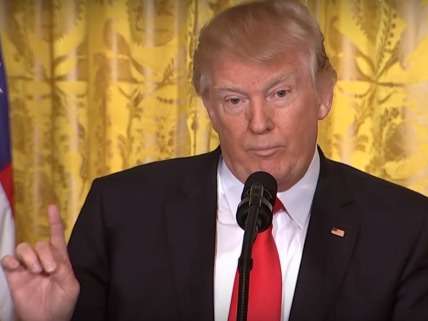Retreat From Electoral Vote Boast Shows Trump Can Be Forced to Acknowledge Reality
The president says he expects the press to challenge his alternative facts.

Donald Trump's rambling, whiny, narcissistic press conference last week was disturbing in several ways, but there was at least one encouraging sign: The president showed he is capable of taking correction—something that was very much in doubt given the long list of fantasies he has repeatedly peddled as truth. During his introductory remarks, appropos of nothing but his constant need to stroke his own ego, Trump called his election victory "the biggest Electoral College win since Ronald Reagan." It wasn't. While Trump's electoral vote total (304) beat George W. Bush's in 2000 (271) and 2004 (286), it was lower than Barack Obama's in 2008 (365) and 2012 (332), Bill Clinton's in 1992 (370) and 1996 (379), and George H.W. Bush's in 1988 (426). When NBC reporter Peter Alexander pointed out that Trump had his facts wrong, Trump retreated:
Alexander: You said today that you had the biggest electoral margins since Ronald Reagan with 304 or 306 electoral votes. In fact, President Obama got 365 in 2008.
Trump: Well, I'm talking about Republican. Yes.
Alexander: President Obama, 332. George H.W. Bush, 426 when he won as president. So why should Americans trust—
Trump: Well, no, I was told—I was given that information. I don't know. I was just given. We had a very, very big margin.
Alexander: I guess my question is, why should Americans trust you when you have accused the information they receive of being fake when you're providing information that's fake?
Trump: Well, I don't know. I was given that information. I was given—actually, I've seen that information around. But it was a very substantial victory. Do you agree with that?
Alexander: You're the president.
It is hard to imagine that anyone on Trump's staff gave him "that information," which a simple Google search would have revealed to be false. More likely, he saw the claim "around" and uncritically accepted it, as is his wont for anything that flatters him or fits his agenda. But rather than insisting on the accuracy of his alternative facts (as he did with his fanciful claim that thousands of Muslims in Jersey City publicly celebrated the collapse of the Twin Towers), Trump backed down, retreating to the statement that his victory was "very substantial" (which is also an improvement on the "landslide" he had previously claimed). That concession to reality counts as progress, I think, provided Trump does not repeat his electoral vote whopper now that it has been unambiguously refuted (as he did with his claim that the U.S. murder rate is higher than it has been in four or five decades).
Later in the press conference, Trump alluded to Alexander's correction in the process of asserting something else that is not true:
You [members of the press] have a lower approval rate than Congress. I think that's right. I don't know, Peter, is that one right? Because you know, I think they have lower—I heard, lower than Congress.
As is often the case, what Trump heard (or thinks he heard) is not correct. According to Gallup's numbers, 9 percent of Americans have "a great deal" or "quite a lot" of confidence in Congress. The comparable figures for newspapers and TV news are 20 percent and 21 percent, respectively. Or to put it a different way, 55 percent of Americans have "very little" or no confidence in Congress, compared to 36 percent and 40 percent, respectively, for newspapers and TV news. Other surveys likewise find that Congress is less trusted than the press. But notice how Trump, now aware that people with actual facts might contradict him, hedged his statement about the relative approval ratings of legislators and journalists.
Trump, who on Friday identified "the FAKE NEWS media" as "the enemy of the American People," claimed at the press conference that he does not mind when journalists correct him:
I don't mind bad stories. I can handle a bad story better than anybody as long as it's true. And over a course of time, I'll make mistakes and you'll write badly and I'm OK with that. But I'm not OK when it is fake. I mean, I watch CNN—it's so much anger and hatred and just the hatred.
Trump's habit of calling accurate reports that reflect negatively on him "bad stories" is telling, and it is hard to believe that the notoriously thin-skinned bully "can handle a bad story better than anybody." But if Trump is willing to concede that Alexander was simply doing his job when he pointed out that the president was making shit up, that's a start.


Show Comments (58)